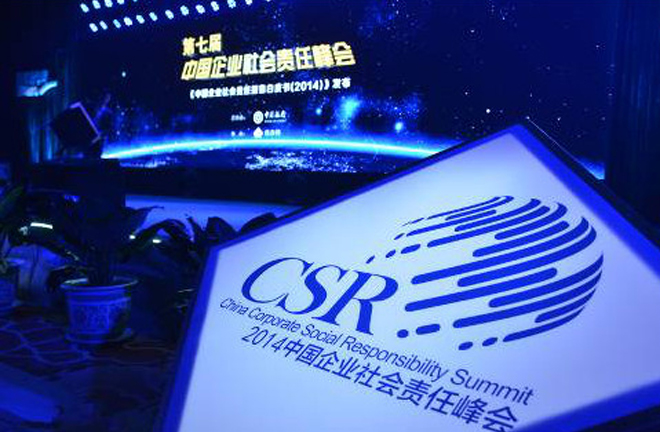Scholars debate economic value of morality

The 2014 China Corporate Social Responsibility Summit was held in Beijing on Jan. 15, 2015, and many enterprises and entrepreneurs won awards owing to their contributions to environmental protection, welfare innovation and social communication.
Since the second half of the 20th century, the economic value of morality has been highly controversial. Debate has mainly focused on whether morality has economic value, what role morality plays in business, and how to economically measure morality.
The concept of “moral capital” has been at the core of debate over whether morality has economic value.
Wang Xiaoxi, vice-president of the China Association for Ethical Studies and a professor at the School of Public Administration at Nanjing Normal University in Jiangsu Province, put forward the idea of “moral capital” in his paper titled “Discussion on Moral Capital” published in the Jiangsu Social Sciences journal (Volume 3, Issue 2000).
Wang argued morality can provide a benign working environment and necessary social conditions for production development at a macro level, while also reducing social costs.
However, some scholars claimed that people risk misunderstanding morality if its economic value or capital logic is unilaterally emphasized.
Other scholars said that although morality possesses certain characteristics in economics, it is not a capital entity.
“Morality should have an instrumental function,” said Wang, adding that means can be translated into purpose if we do not understand them in an absolute sense.
The economic value of morality is not only a complicated theoretical issue but also a significant practical one. Some scholars said that exploring the economic value of morality aims to guide and rectify economic activity involving irrational values to explore a more rational path for social development.
Wang said that emphasizing the positive economic value of morality does not mean ignoring or denying its limitations. In contrast, correctly understanding it is based on a clear definition of morality that holds economic value.
The economic value of morality also has limitations. Yu Dahuai, dean of the School of Marxism at Hohai University in Nanjing, Jiangsu Province, said that morality has economic value and “moral capital” can dictate entrepreneurs’ strategies and methods. “They may stress, ignore or even fight morality in investment activities,” added Yu.
“The economic value of morality can be realized if meeting certain premises and conditions,” said Wang, adding that only by conforming to the laws of social development can morality promote economic development.
Following debate over the past decade, the economic value of morality and the concept of “moral capital” have been approved by academia. At present, academia pays attention to one significant issue: how to attain and use “moral capital.”
“If the issue of the economic value of morality is further divided into whether morality possesses economic value and how to measure such economic value, academia has replied in the affirmative for the former and yet to give a satisfactory answer for the latter,” Wang said.
Some scholars said that debate has taught us that ethnical studies should focus on both theories and practices, while avoiding moral centralism. “Moral capital” reflects economic activities and morality, and it requires research to advance its study, scholars said.
Zhou Zhongzhi, vice-president of the Association for Ethical Studies and director of the Center for Business Ethics Studies at Shanghai Normal University, said that the collision of idealism and reality fuels debate.
“If there is no moral value, it is hard to conduct rational and ordered economic activity,” said Ge Chenhong, a professor at the School of Philosophy at Renmin University of China.
Ge also claimed that the consistency of people’s morality and economic operation can rectify market disruption, unifying the function of morality and rules of the market economy. “Morality and rationality should become internal rules of the market economy, restricting and guiding economic entities as well as fundamentally guaranteeing the establishment and improvement of the market economy model,” said Ge.
